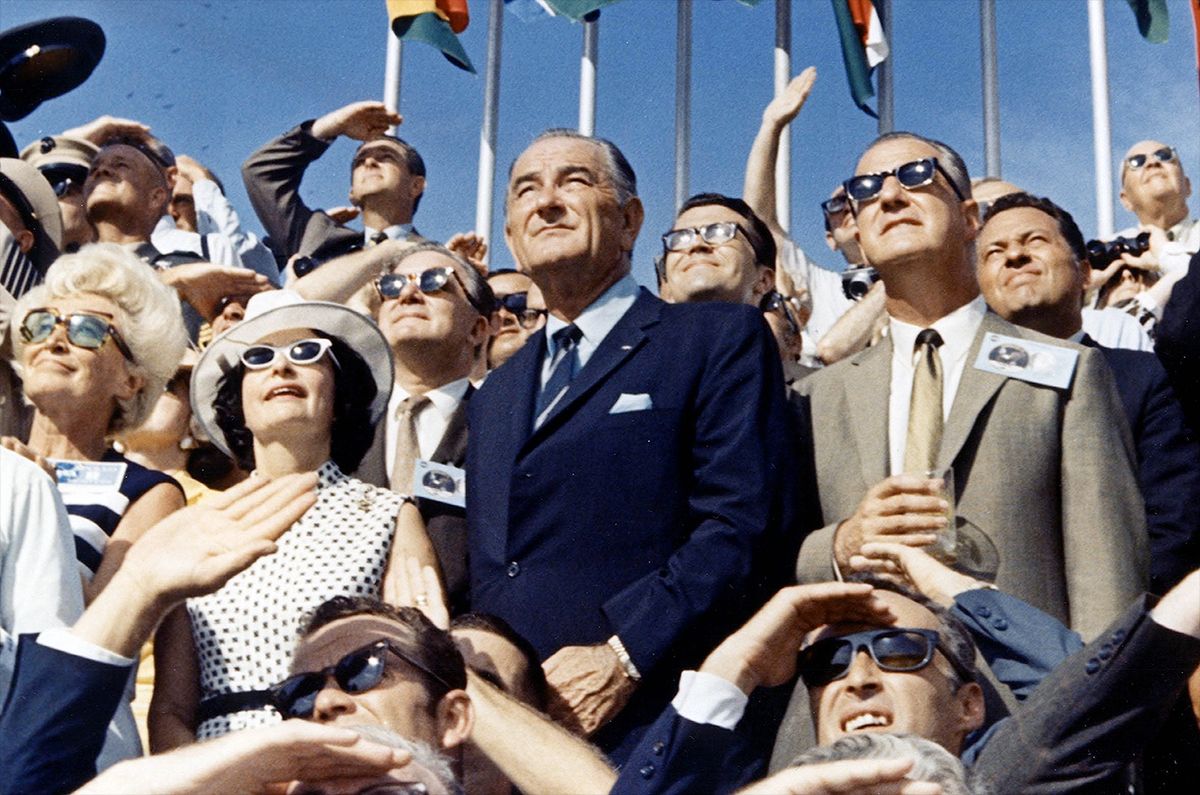Ask the common individual, not to mention a space fanatic, to call the U.S. politician who earned the title “Mr. Area,” and Lyndon B. Johnson shouldn’t be more likely to be their first reply.
Earlier than turning into vp and president of the US, Johnson took a management position in shaping the nation’s space coverage within the opening weeks of the Area Age. As the bulk chief within the Senate, he helped kind the response to the Soviet Union’s launch of Sputnik, the world’s first satellite, in 1957.
It “put him up-front within the public eye as being ‘Mr. Area,’ a picture he held for a few years because the one politician who was actually within the space program and its implications for the way forward for the US and its place sooner or later growth of mankind,” Glen Wilson, who served as a workers assistant to Johnson within the Senate, wrote in a 1992 essay on the origins of the laws that created NASA.
Now, a long time later, the nation could have forgotten the impression Johnson had in steering the course of the U.S. space program properly past the time he was in workplace and even the years he was alive. The selections that he made, together with championing the Outer Space Treaty and Apollo program, proceed to influence today’s activities in space (opens in new tab).
Associated: Presidential visions for space exploration: From Ike to Biden
“There is not any query that LBJ’s legacy regarding space is below appreciated and undervalued as we take a look at the historical past of space exploration,” stated Mark Updegrove, former director of the Lyndon B. Johnson Presidential Library (opens in new tab) and president and CEO of the LBJ Foundation (opens in new tab), in an interview.
Updegrove spoke with collectSPACE.com (opens in new tab) concerning the contributions LBJ made to space exploration coverage and the way the president’s legacy is perceived at present, half a century after the president’s dying on Jan. 22, 1973. This interview has been edited for size and readability.
collectSPACE (cS): For these not acquainted, what was it that first gave Johnson the fame of being “Mr. Area” within the public eye?
Mark Updegrove: It was Lyndon Johnson actually who was the chief catalyst for the creation of NASA in 1958, after Sputnik had been launched by the Soviet Union (opens in new tab) in 1957. He labored very intently with Dwight Eisenhower to make sure the US would reply in a accountable strategy to the Soviets’ first foray into space and the worry that they’d dominate space, giving them a significant leg up technologically at a time when the Chilly Struggle outlined geopolitics. Lyndon Johnson, because the omnipotent majority chief, was very a lot on the forefront of making a space program that will reply to the Soviets’ efforts in space.
cS: Was Johnson’s curiosity in space strictly about gaining a political benefit?
Updegrove: I do not know that it was political benefit. I believe there was a deep concern that the Soviets would gain a technological advantage and be capable of put weapons within the sky. Once more, that is at a time when MAD — Mutual Assured Destruction — was an acronym that everyone knew as a result of there was a deep worry of a nuclear change. In reality, the majority of the American individuals by the point that John F. Kennedy took the presidency believed that there could be a nuclear change of their lifetimes.
So, we had been deeply involved about any benefit that the Soviets may need over the US. In reality, John F. Kennedy earned the presidency principally by instilling fears in America that there was a missile hole between the Soviet Union and the US. The Soviets putting up Sputnik (opens in new tab) and displaying that they may truly launch one thing into space, confirmed that they had been, at the very least within the minds of some, technologically superior and will use that to their navy benefit.
Associated: What was the space race? Origins, events and timeline
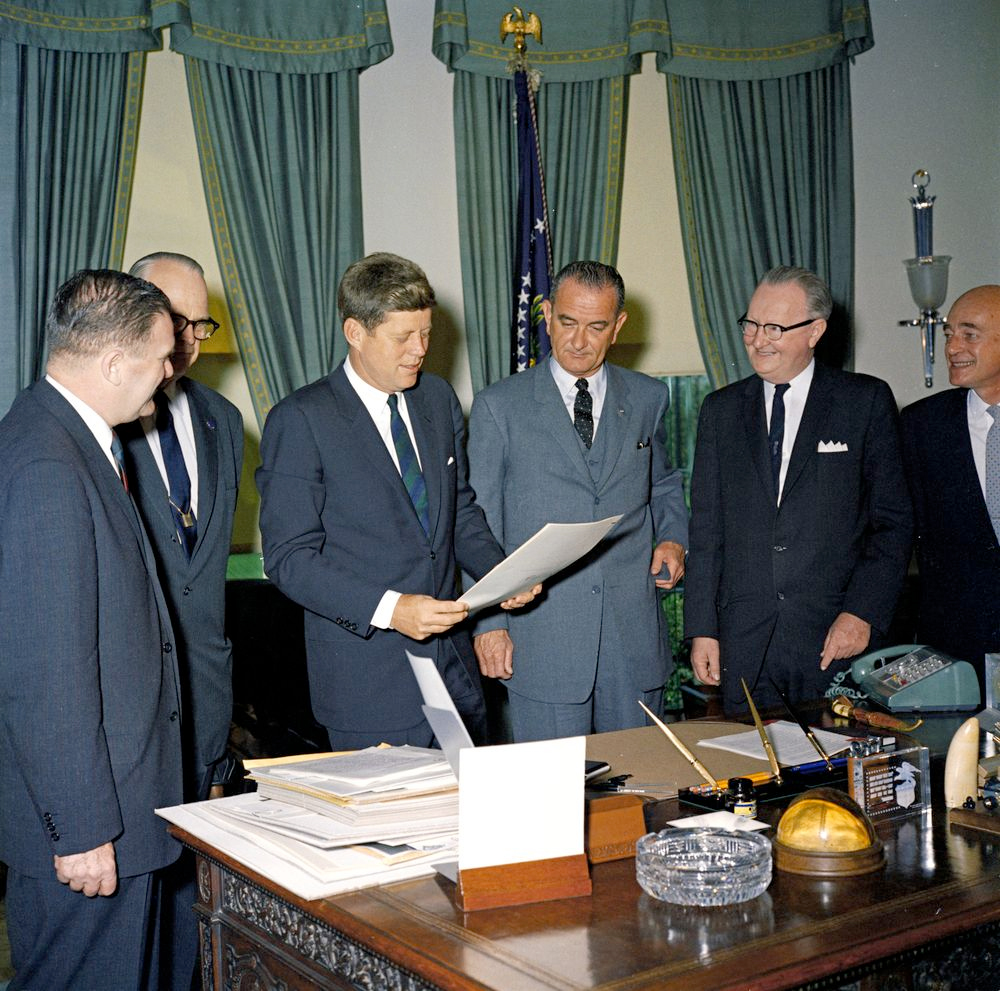
cS: Is there proof that LBJ additionally had a private curiosity in space exploration? Did he see it as a scientific endeavor as properly?
Updegrove: I do not know if that was a part of his considering.
Whereas we had been involved about technological superiority, we additionally wished to point out the world the can do nature of who we’re as People. I believe that in all probability intrigued Lyndon Johnson extra so than the scientific benefits, though there are issues within the Nice Society that confirmed he had an actual curiosity in science, in addition to the humanities and all totally different facets of American life.
However to my thoughts, one of many principal causes that he did this was to point out the world that we had the technological know the way to do that and the can do spirit. That was one of many highest accolades that Lyndon Johnson might pay to anybody, to name you “a can-do man” or “a can-do girl.” He embodied that himself. He was capable of do issues, which is the very purpose that John F. Kennedy tasked him with determining what our space efforts would appear like going ahead after the preliminary creation of NASA.
cS: Some historians consider that if Kennedy had not been assassinated, we might not have landed on the moon in 1969. Kennedy had tried 3 times to curtail this system and had been unsuccessful in his efforts to have interaction the Soviets in a joint mission. White Home audio recordings recommend his curiosity in supporting NASA’s actions had been guided by geopolitics.
With that in thoughts, what was it that drove Johnson’s curiosity to proceed Apollo after Kennedy’s dying, given congressional and public scrutiny on the time? Why did he really feel it was so necessary to realize the moon touchdown?
Updegrove: I wrote a book on John F. Kennedy called “Incomparable Grace” (opens in new tab) that got here out final yr and I am unsure I share that evaluation. I do know that Kennedy talked to [NASA Administrator] James Webb and talked about pulling the plug on this system if if it wasn’t one thing that we might do. However I do suppose he was additionally intrigued by the journey of all of it.
At first, it was a measure to equalize issues within the Chilly Struggle. For the very causes I recommended that Lyndon Johnson supported the creation of NASA and our efforts in space for political causes, so too did John F. Kennedy. However I additionally suppose for those who hear about Kennedy’s conversations that he had with the Apollo astronauts, I believe he was actually intrigued with the journey of space as properly. There’s proof of that and it very a lot suits in with the Kennedy picture and the Kennedy persona for my part.
Lyndon Johnson, I believe, was deeply dedicated to NASA from the start. It bears mentioning that I am unsure that we might have reached the moon by the top of the last decade however for the Apollo 1 fire that happened in 1967 (opens in new tab), killing three astronauts. LBJ’s presidency exhibits, notably because it pertains to civil rights, that he let no good disaster go to waste. And I believe with the Apollo 1 fire, he noticed that the initiatives had been mismanaged, shortcuts have been taken to fulfill deadlines and work was unintentionally compromised. It was a possibility to reevaluate this system when the fireplace occurred and to make NASA higher.
So with out that, as quickly because the Apollo 1 fireplace got here within the wake of the Gemini missions, I am unsure we might have achieved our objective of sending a person to the moon by the top of the last decade.
Associated: NASA’s 17 Apollo moon missions in photos
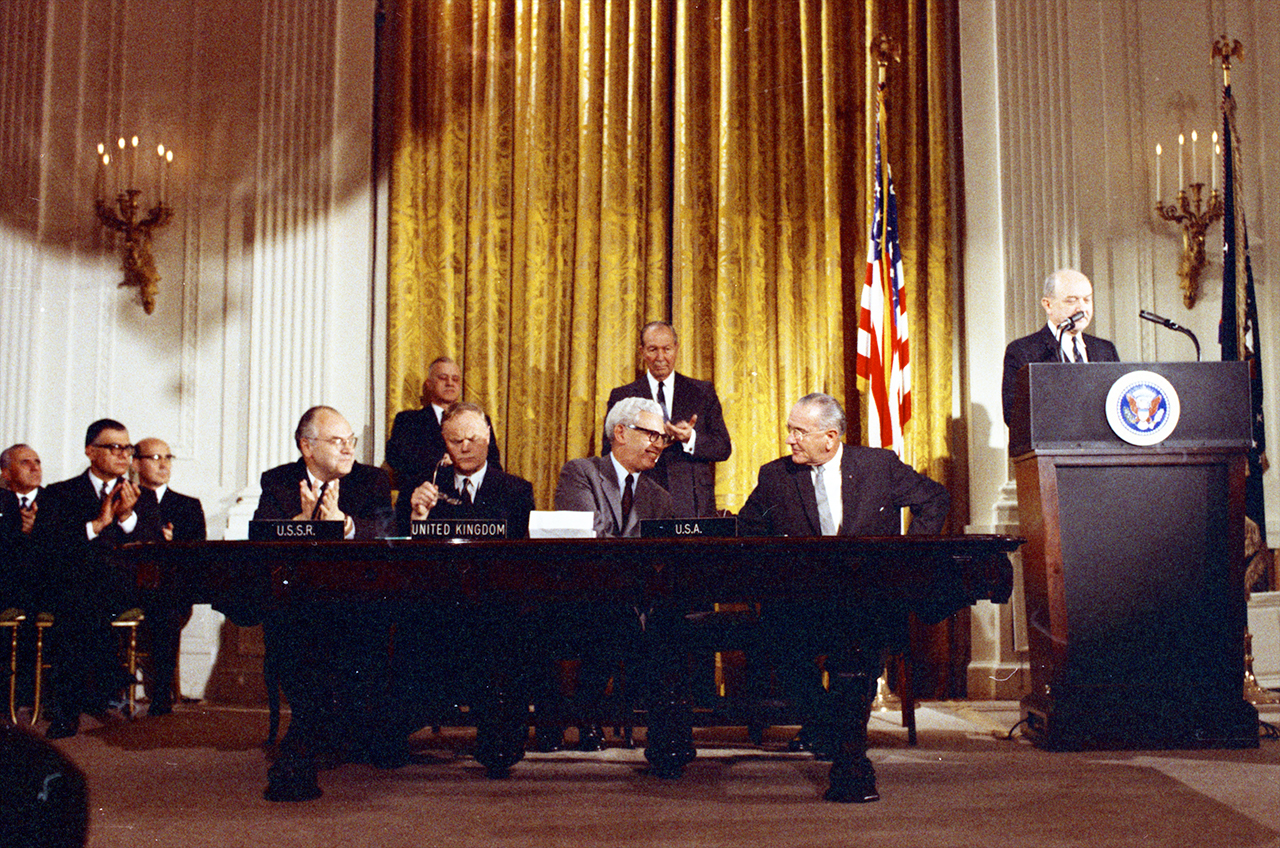
cS: Past the creation of NASA and advancing the moon touchdown, the opposite main space-related effort by LBJ was the Outer Area Treaty. How necessary to him was it to make it possible for space exploration was executed in a peaceable method, not simply by the U.S., however by all space-faring nations around the globe?
Updegrove: [The treaty] is likely one of the unheralded triumphs of the Johnson administration. I will use LBJ’s own words (opens in new tab): “This treaty implies that the moon and our sister planets will serve solely the needs of peace and never of warfare. It implies that astronauts and cosmonauts will meet sometime on the floor of the moon as brothers and never as warriors.”
We noticed the plaque that the Apollo 11 astronauts and President Nixon signed when the Apollo 11 mission went to the moon in July of 1969: “We are available peace for all mankind.” I am unsure there would have been that form of tenor with out the Soviet Union agreeing, and different nations agreeing, to the Outer Area Treaty, guaranteeing that we didn’t put weapons into space. That rendered the space race far much less harmful. It made it this check of the human spirit, not a possibility to place weapons within the sky, in addition to on planet Earth.
cS: Have you learnt if LBJ had some sense of how long-lasting the Outer Area Treaty could be, given the way it continues to function the idea for all of space legislation at present?
Updegrove: I do not know, however I believe he could be terribly happy that it is nonetheless binding. That and the Nuclear Non Proliferation Treaty are issues which have stood the check of time. They’ve stood in place for approaching 60 years now. It’s outstanding. It is superb how they formed the longer term at a time once we had been advancing so quickly technologically. He’d be more than happy that they nonetheless are in place at present and nonetheless have tooth.
cS: Had Johnson not withdrawn from searching for a second (full) time period as president and had he prevailed over Nixon, how do you suppose the space program could be totally different at present? Do you suppose he would have pushed to proceed Apollo additional, or do you suppose he would have pursued the space shuttle like Nixon did, having arrived on the identical conclusion primarily based on the financial system on the time?
Updegrove: My guess is that he would have seen the eroding public help for the very costly space program. This can be a man who had huge ambitions domestically, and I believe he in all probability would have seen the expense of NASA as compromising among the legal guidelines that he may placed on the books in an effort to improve the Nice Society. That’s my guess.
He was a political pragmatist, and I believe he would have bowed to the needs of the American individuals having achieved the objective of placing a person onto the moon, not simply as soon as however on six totally different missions. Twelve American males walked on the face of the moon. That is a fairly large accomplishment. I believe the pragmatist, within the political sense, and the fiscally prudent Lyndon Johnson would have would have capitulated and stated, “I hear the American individuals and we’ll curtail our efforts in time, however we’ll purpose for different space efforts down the road.”
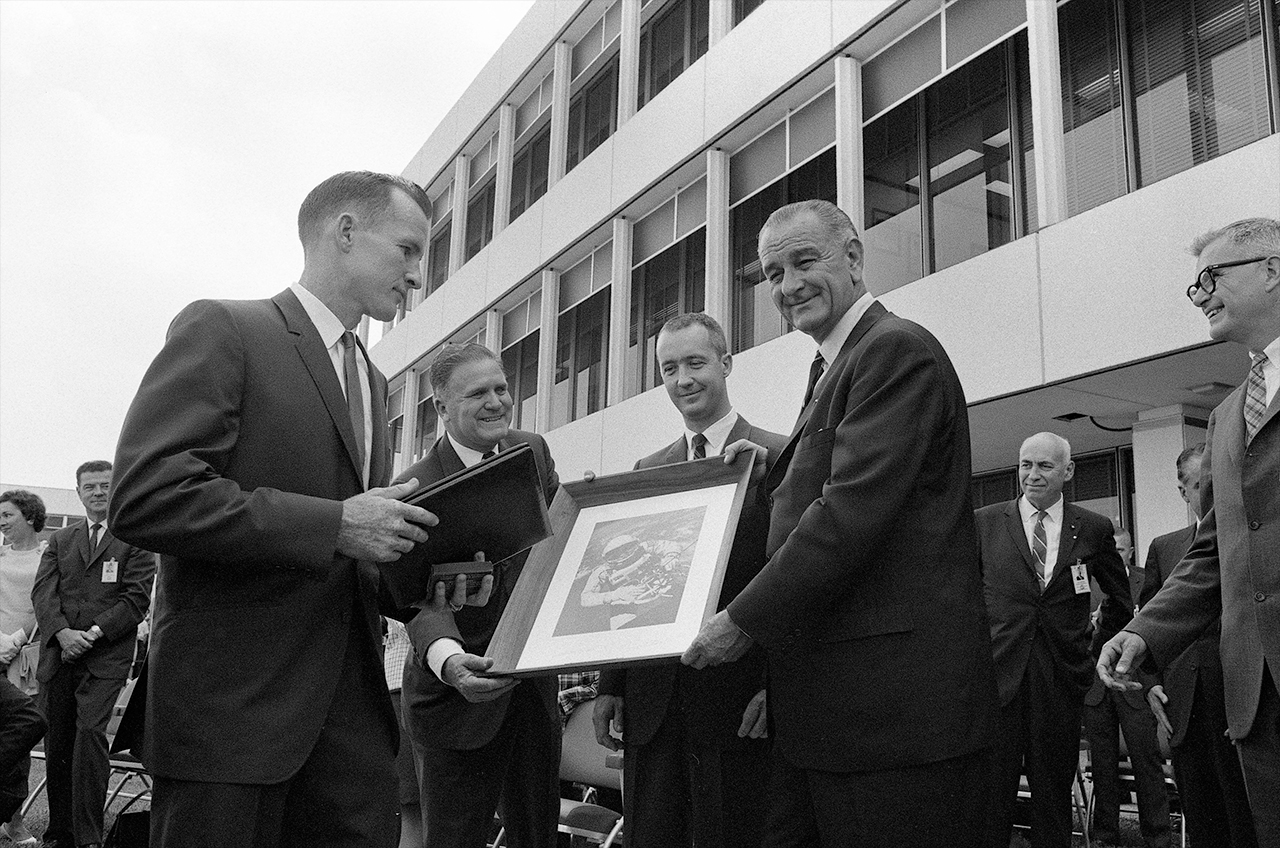
cS: The six moon landings had been certainly an enormous achievement. Why do you suppose LBJ doesn’t get extra credit score for them, at the very least when it comes to the general public associating him with accomplishment?
Updegrove: One of many causes that Lyndon Johnson does not get credit score is as a result of he wasn’t president when the foremost milestones in space occurred. He wasn’t there when the Mercury missions occurred, placing us in space for the primary time. We did have the spacewalk during the Gemini missions (opens in new tab), however let’s face it, the actual life milestone in space exploration was the Apollo 11 moon touchdown. Apollo 8 was large on the time when Lyndon Johnson was nonetheless president on the finish of 1968 when that mission occurred, and it was big within the historical past of space, however it was actually outmoded by the touchdown of males on the moon with the Apollo 11 mission.
Richard Nixon will get as a lot credit score for space exploration by advantage of being president when Apollo 11 went up as Lyndon Johnson does. So that’s little bit of misfortune for Lyndon Johnson when it comes to the timing of his presidency.
cS: Do you suppose that there is something that may be executed at present to appropriate that document, to verify the general public understands that Johnson was important to all the things that Kennedy and Nixon is related to when it comes to space?
Updegrove: I believe if the general public knew what LBJ was doing behind the scenes, they’d perceive that it was actually a co-effort. In the end, the 2 presidents by far who contributed probably the most to our efforts in space are John F. Kennedy and Lyndon Johnson.
It was John F. Kennedy who boldly said (opens in new tab) we’ll put a person on the moon earlier than the top of the last decade at a time when the Soviet Union had big benefits within the space race. At that time, they had been far forward of us. However the purpose he did it’s due to a memo from his vp, who advised him that we will do it by the top of the last decade. Lyndon Johnson assures John F, Kennedy in his memo that it may be executed, and it’s with that assurance that Kennedy goes ahead with that extremely daring assertion.
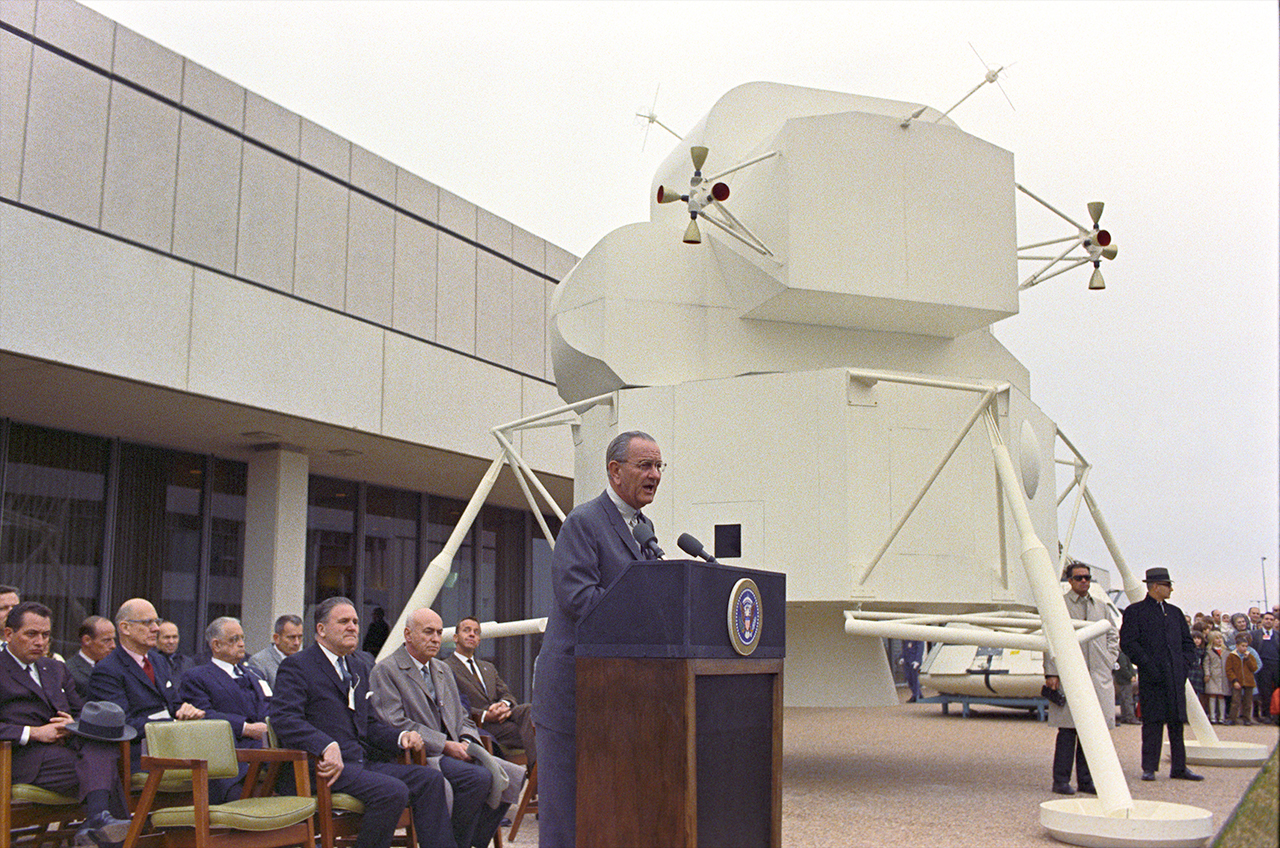
cS: The place do you personally rank LBJ’s space legacy as in comparison with his different accomplishments?
Updegrove: That is a extremely good query. I believe that legacy of Lyndon Johnson is a three-legged stool.
At first, you’ve got the legal guidelines of the Nice Society, which I alluded to earlier, and they’re breathtakingly far-reaching. However specifically, it is these legal guidelines that relate to civil rights (opens in new tab) that make it so distinctive as a result of there had been no nice progress since Reconstruction on the difficulty of civil rights, and it is Lyndon Johnson that makes us true to our most sacred creed, which is that every one males are created equal. That is probably the most primary tenet of American egalitarianism. And it does not occur till the flurry of legal guidelines which are signed by Lyndon Johnson, most notably the Civil Rights Act, the Voting Rights Act and the Honest Housing Act. These are vitally necessary within the within the historical past of our nation.
Second, you have to put the tragedy of Vietnam. It’s Lyndon Johnson who’s primarily chargeable for the escalation of the warfare. The buck stops in massive measure with our Commander in Chief, and it was on his watch that we escalated the warfare.
However then the third leg of that stool, importantly, is being a catalyst as Senate majority chief for the creation of NASA and being a significant supporter of that program, not solely when he was within the Senate, however as vp and president. I am unsure that there will likely be a much bigger story within the twentieth century than us leaving this celestial physique and going to a different for the primary time within the historical past of the world. That is a fairly large accomplishment, and Lyndon Johnson deserves as a lot credit score for that as I consider any politician.
cS: How do you suppose he would rank these three himself?
Updegrove: I do not know. He was he was enormously happy with what he achieved in space and seemed with pleasure upon these missions, Apollo 8 and Apollo 11 specifically. However the place he would rank it when it comes to his legacy, I can not say.
I believe he would in all probability need it to return forward of Vietnam, however he would additionally perceive that Vietnam was sure to be a vitally necessary a part of his legacy.
Observe collectSPACE.com (opens in new tab) on Facebook (opens in new tab) and on Twitter at @collectSPACE (opens in new tab). Copyright 2023 collectSPACE.com. All rights reserved.


